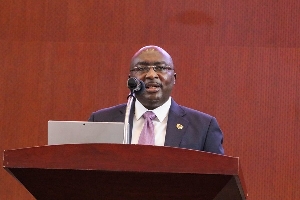Regional News of Friday, 6 March 2015
Source: GNA
Ghana launches Open Government Partnership Report
The Independent Reporting Mechanism of the Open Government Partnership, has released a Report assessing Ghana’s compliance with Open Government Partnership process, and the implementation of open government commitments in the country.
The Open Government Partnership is a voluntary international initiative that aims to secure commitments from governments to their citizenry, to promote transparency, empower citizens, fight corruption, and harness new technologies, to strengthen governance.
Ghana joined OGP in 2011, and at the end of 2012, government developed an action plan containing 13 open government commitments in consultation with a variety of Ghanaian civil society organizations.
Ghana’s plan contained several commitments focused on increasing transparency in government revenue and expenditure.
The plan had a lot of commitments that many described as ambitious, but implementation on a number of them remained limited, particularly in the areas of the auditor’s report, the passage of fiscal responsible act and extractive sector revenue management, among others.
Mr Nicholas Adamtey, researcher and consultant of the Project, noted that in spite of the limitations; government has adopted and implemented a variety of measures in governance.
He explained that the research which was carried out between July and September 2014, accessed information that was readily available, and could be obtained by any ordinary citizen.
He said in open governance information ought to be easily accessible, without having to exert so much effort.
Ghana’s Action Plan was produced with support from the World Bank, and in accordance with the process of multi-stakeholder consultations agreed by OGP member-countries.
Ghana signed the open government partnership with a view to deepening existing democratic structures through the promotion of accountability, transparency, citizen’s participation and the use of innovative technology for development.
But Mr Alhassan Azong, Minister of Public Sector Reforms, said the signing onto OGP was an indication of the government’s commitment to working with civil society organisations, to empower the citizenry individually and collectively to demand accountability from managers of the country’s resources.
It was also the indication of government desire to bring to bear more transparency on government transactions, he added.
The implementation of Ghana’s OGP plan, 2013 to 2014, faced with dire resource constraints, particularly the coordination of the implementation process.
“This has led to the inability of the public sector reform secretariat, to effectively generate the needed awareness among all stakeholders in the OGP, in order to build the expected enthusiasm and momentum to derive the OGP process in Ghana,” Mr Azong added.
Ghana is expected to prepare her second generation action plan and the circumstances that existed in 2012 when the first action plan was prepared still exist, he said.
The Ghana government, under the auspice of the Public Sector Reform secretariat, began implementation of its action plan in January 2013.
Some of the most ambitious pledges made in the action plan included plans to prepare and pass the fiscal responsibility bill; pass the Mineral Development Fund Bill; tracking of government investments; and amendment of composition of Audit Report Implementation Committees to include CSO representatives and independent professionals.
The rest are the National Information and Technology Agency to open two portals to facilitate the collection and dissemination of data to serve citizens; and pass the right to information law.










